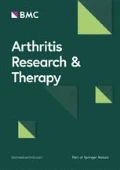Evidence suggests that chronic inflammation in several human autoimmune diseases, such as rheumatoid arthritis (RA), is mediated by activated Th1 cells. Delineation of the regulatory mechanisms controlling a Th1-biased human immune reaction and its pathologic potential is, therefore, a critical step in the understanding of chronic autoimmune inflammation. We analyzed T-cell subsets from patients with RA with regard to their regulatory capacity for Th1 inflammation. Flow cytometric analysis of freshly isolated peripheral blood (PB) and synovial fluid (SF) T cells revealed that rheumatoid inflammation is characterized by the absence of Th2 cells and their cytokines. Moreover, resting T cells from patients with RA expressed an impaired ability to differentiate into Th2 effectors with a potential to downmodulate Th1 inflammation. Thus, altered Th2 cell differentiation might contribute to the imbalance in favor of inflammatory Th1 cells in RA. Whereas Th2 cytokines, such as IL-4, play essential roles in regulating the development and perpetuation of Th1-mediated autoimmune responses, a novel subset of regulatory CD4 T cells that express CD25 on their surface and perform their suppressor function on the development of autoimmune inflammation by cytokine-independent mechanisms has recently been described in animals and humans. However, their in vivo role in human inflammation is largely elusive. We identified CD4CD25pos T cells in the PB and the SF of patients with active RA. Importantly, CD4CD25pos T cells from both RA PB and RA SF exerted potent suppressive activity as proliferation of autologous peripheral blood mononuclear cells was significantly inhibited by the presence of CD4CD25pos T cells compared with proliferation in the presence of CD4CD25neg T cells. CD4CD25 regulatory T-cell-mediated inhibition of the proliferation was abrogated by addition of exogenous IL-2, a characteristic of CD4CD25 regulatory T cells in animals. Moreover, RA CD4CD25 T cells had a markedly decreased proliferative capacity in response to anti-CD3 monoclonal antibody, suggesting an anergic phenotype typical for CD4CD25 regulatory T cells. Together, the data indicate that, in contrast to immunomodulatory Th2 effectors, CD4CD25pos T cells with potent suppressive potential are present in rheumatoid inflammation. The data further suggest that CD4CD25pos regulatory T cells are involved in the continuous regulation of the developing human Th1 inflammation in vivo. However, their activity appears to be insufficient to silence the chronic immune response in RA.
Author information
Authors and Affiliations
Rights and permissions
About this article
Cite this article
Schulze-Koops, H., Lipsky, P., Kalden, J. et al. T-cell regulation in the pathogenesis of autoimmune diseases. Arthritis Res Ther 5 (Suppl 3), 117 (2003). https://doi.org/10.1186/ar918
Published:
DOI: https://doi.org/10.1186/ar918

